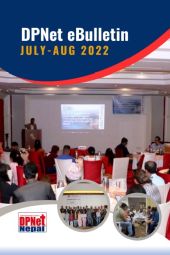July-Aug 2022 DPNet eBulletin
Summary
This e-bulletin highlights a series of vital engagements and discussions organized by the DPNet throughout July and August 2022, focusing on enhancing DRR efforts in Nepal. A significant highlight was the Media Engagement program on Hydro-Meteorological Forecasting Systems, held on 10th July, aimed at empowering journalists with the knowledge and tools to accurately disseminate information on hydro-meteorological disasters. This program, supported by the Flood Resilience Alliance members Mercy Corps and Practical Action, highlighted the crucial role of early warning systems in reducing vulnerabilities and the need for evidence-based planning and investments in resilience measures.
The Asia-Pacific Ministerial Conference on Disaster Risk Reduction (APMCDRR) Participation Preparatory Discussion Meeting on 12th July marked another key milestone, setting the stage for Nepal's proactive participation in the upcoming conference in Australia. The meeting, which attracted 76 participants, outlined the thematic focus of the conference and Nepal’s contributions, including presentations, marketplace showcases, and ignite stages. A notable outcome was the creation of a basket fund under the NPDRR Secretariat to support APMCDRR-related activities, emphasizing a collaborative approach to showcasing Nepal's DRR achievements and learning from international practices. The alarming situation caused by the Saptakoshi flood in July prompted DPNet to organize a discussion on the emergency response required for the affected communities in Sunsari and Udaypur districts. The meeting highlighted the immediate need for tents, sanitation materials, and other humanitarian aid for displaced families, showcasing the collaborative effort between NDRRMA, local disaster management committees, and various humanitarian organizations.
In August, a discussion meeting further delved into APMCDRR preparatory work and other contextual issues, including the celebration of World Humanitarian Day and addressing urban flooding in Kathmandu. The meetings emphasized the importance of inclusivity, evidence-based advocacy, and the need for a unified national voice in DRR efforts. A significant proposal was the establishment of a National Volunteer Bureau to streamline volunteer management and enhance disaster response efficiency. The World Humanitarian Day celebration on 19th August was a touching reminder of the sacrifices and contributions of humanitarian workers in Nepal. The event not only honored the frontline workers but also shed light on the challenges and opportunities in Nepal’s disaster risk governance. The discussions underscored the importance of localizing DRR efforts, empowering communities, and ensuring the safety and rights of humanitarian workers. Throughout these events, DPNet has demonstrated its commitment to strengthening Nepal’s DRR framework through strategic discussions, capacity-building initiatives, and fostering partnerships.
Categories:
DPNet Publication
Sub-Categories:
Ebulletin
Published Year:
2024
